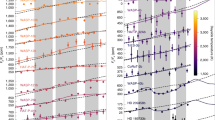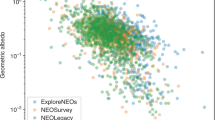Abstract
DURING the past summer, when working at the Dominion Astrophysical Observatory in Victoria, I secured some quantitative data as regards the luminosity of planetary nebulæ. I did not have occasion to elaborate the material until this winter, which I spent in Pasadena, on my leave of absence from the University of Washington at Seattle.1 The method consists of taking a slitless spectrogram of the nebula with its central star, and impressing on the same film on which this spectrum is taken a series of comparison spectra of varying intensities and of the same time of exposure as the nebula. The comparison spectra are obtained from a sensitometer having the daylight sky as a source, a real image of the sensitometer patches being formed at the slit of the spectrograph. The photographs yield the total intensity of each monochromatic picture of the nebular envelope in terms of the intensity per frequency unit of the adjoining star spectrum of approximately the same wave-length.
This is a preview of subscription content, access via your institution
Access options
Subscribe to this journal
Receive 51 print issues and online access
$199.00 per year
only $3.90 per issue
Buy this article
- Purchase on Springer Link
- Instant access to full article PDF
Prices may be subject to local taxes which are calculated during checkout
Similar content being viewed by others
Author information
Authors and Affiliations
Rights and permissions
About this article
Cite this article
ZANSTRA, H. Temperatures of Stars in Planetary Nebulæ. Nature 121, 790–791 (1928). https://doi.org/10.1038/121790a0
Issue Date:
DOI: https://doi.org/10.1038/121790a0
Comments
By submitting a comment you agree to abide by our Terms and Community Guidelines. If you find something abusive or that does not comply with our terms or guidelines please flag it as inappropriate.



